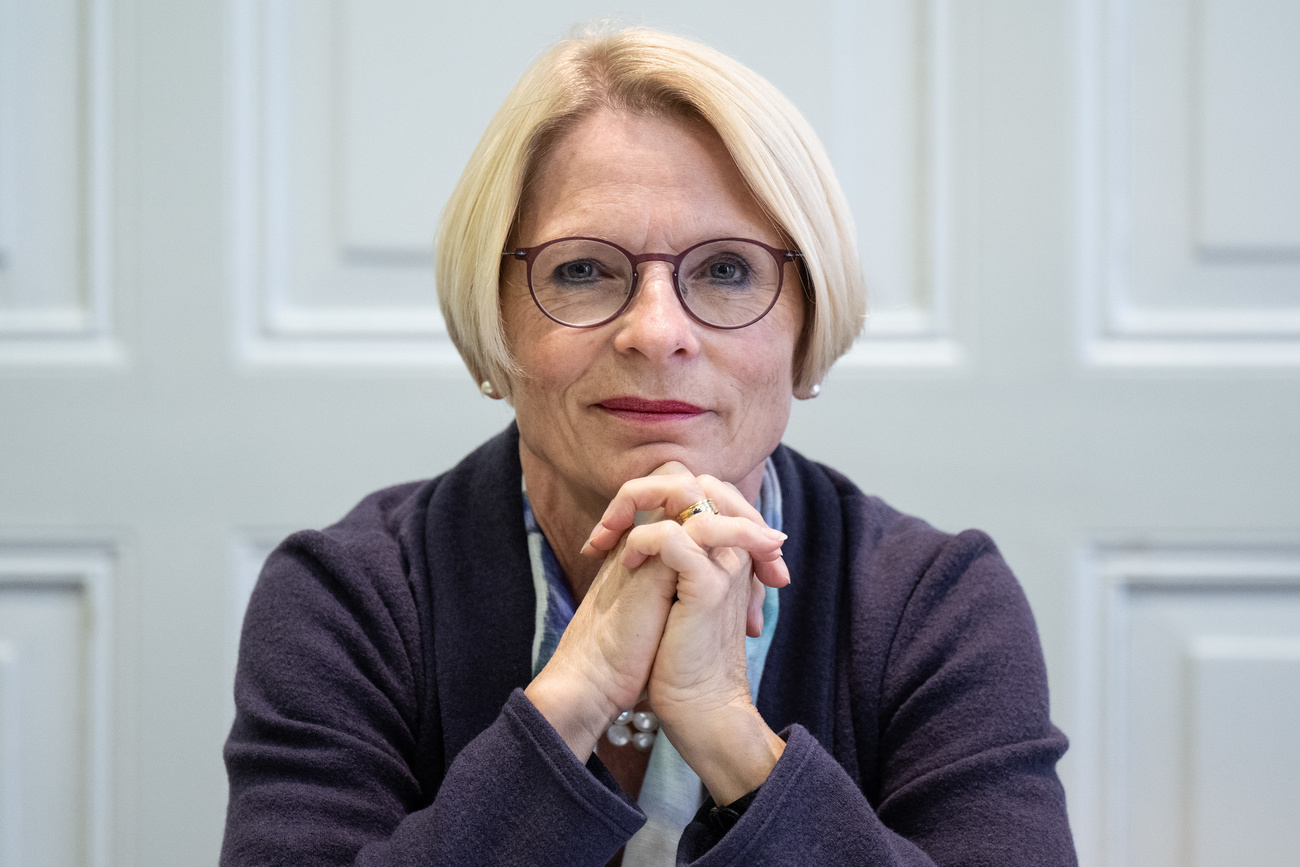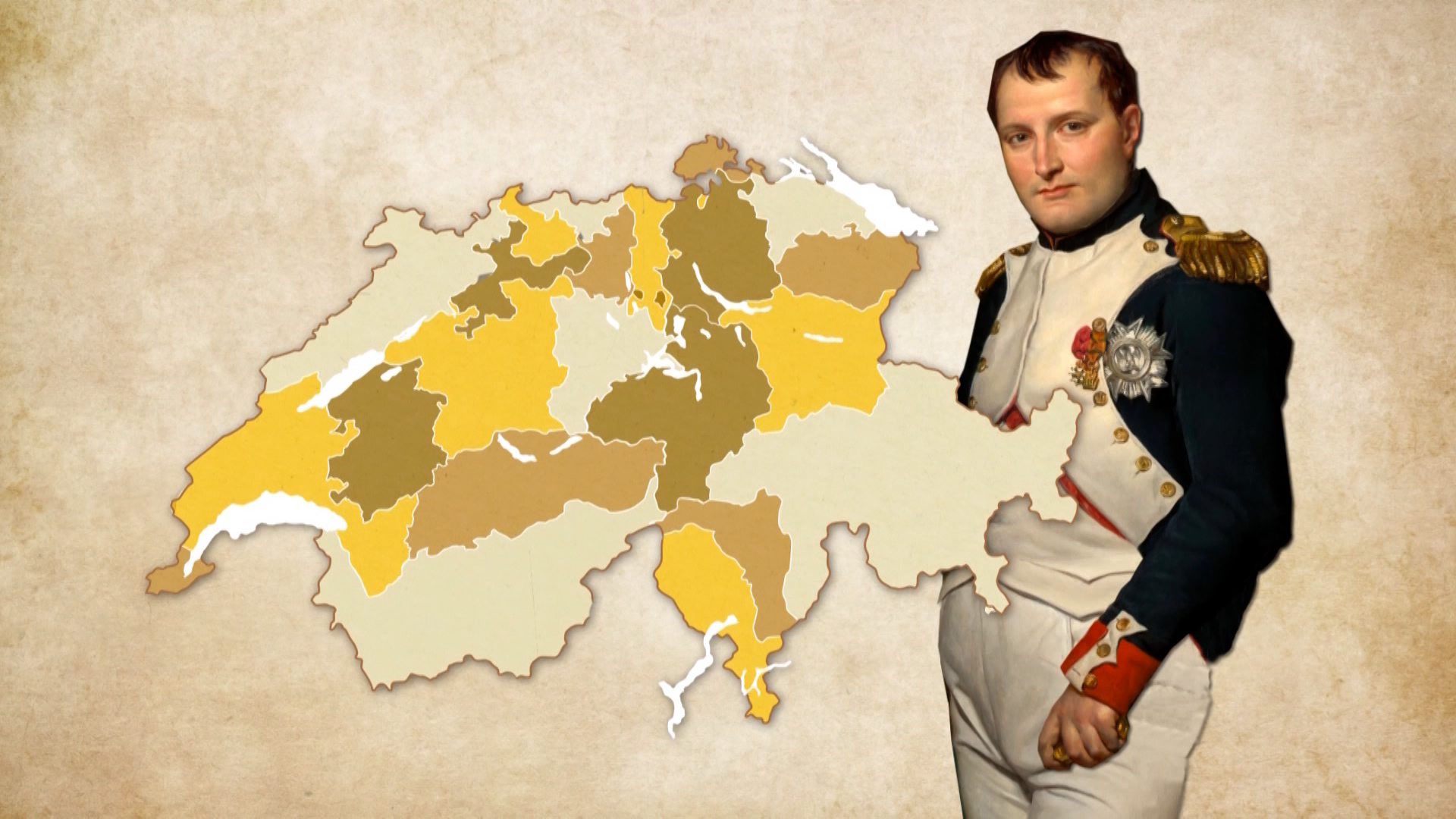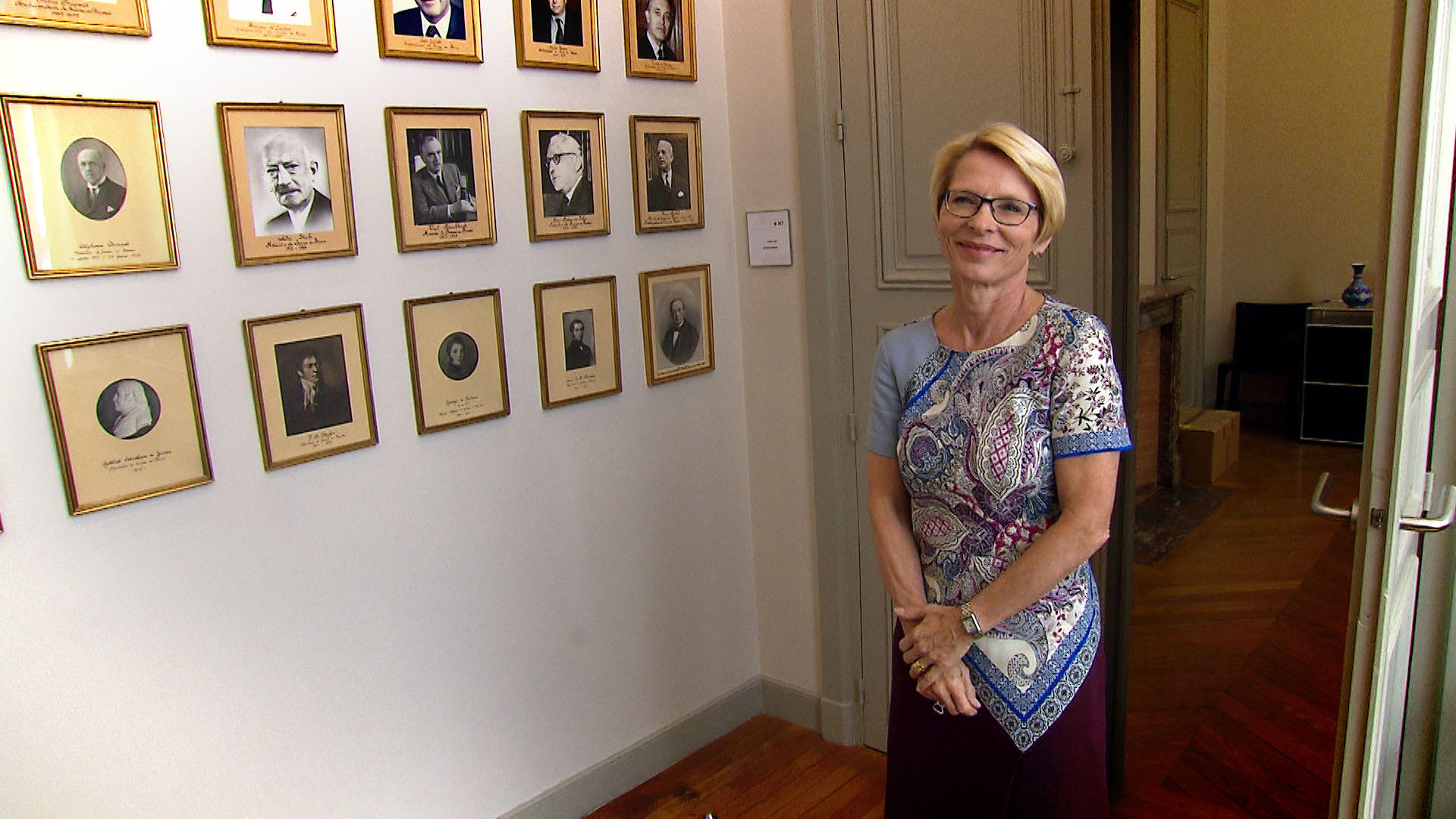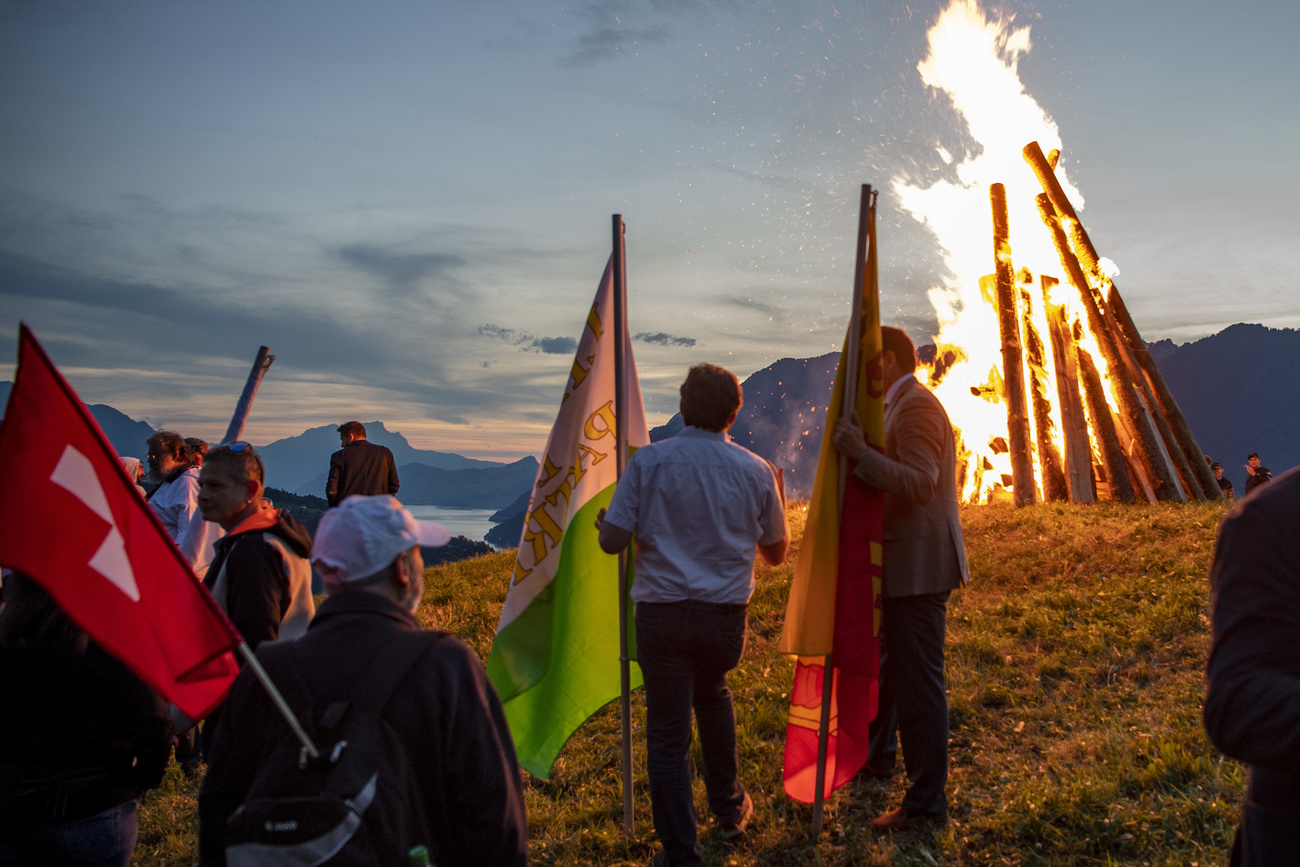Switzerland’s trademark is discretion, says top diplomat Livia Leu

The war in Ukraine, the seat on the United Nations Security Council, the relationship with the European Union: Swiss diplomacy has come under a barrage of criticism in recent years. In this interview with SWI swissinfo.ch, outgoing State Secretary Livia Leu dives into these important issues and explains why she looks forward to yet another post as ambassador.
Livia Leu has served as state secretary of the Federal Department for Foreign Affairs (FDFA) and Switzerland’s chief negotiator with the EU for the last three years. Earlier in her career, the top diplomat was also head of Switzerland’s mission to Iran and ambassador to France. In autumn, the 62-year-old will move to Berlin and become Switzerland’s ambassador to Germany. She will have held some of the most important posts in Swiss diplomacy.
SWI swissinfo.ch: Since Russia’s large-scale invasion of Ukraine, Switzerland has had to put up with a lot of criticism. To put it bluntly: the country has been accused of using its antiquated perception of neutrality for opportunistic reasons. How do you see Switzerland’s reputation abroad?
Livia Leu: The West was united in its response to the war in Ukraine. Switzerland showed its solidarity with Europe. We quickly adopted EU sanctions; we increased our financial support and have now invested more than CHF420 million ($472 million) in international cooperation and humanitarian aid in Ukraine. We have accepted around 80,000 refugees who have not only been supported by the state but also by many private individuals.
And the fact that we do not supply war materiel for reasons of neutrality is widely accepted. It gets more complicated when it comes to the re-export of Swiss war materiel from third countries; some partner countries have a problem with this. But if arms with a Swiss cross end up in a war zone, nobody will care whether they got there directly or indirectly.
SWI: And you have to explain this to your partner countries?
L.L.: Yes, Swiss diplomacy has repeatedly had to explain its position to its partner countries. There is a difference between neutrality law, which is strictly defined, and neutrality policy which allows for more room to manoeuvre.
By the way, the so-called end-user certificates were introduced for governments to express their responsibility that they do not simply supply arms and do not care where they end up. However, this war in Europe has brought about a lot of changes.
SWI: How much damage has the war in Ukraine done to Swiss neutrality?
L.L.: I don’t think Swiss neutrality as such has suffered any damage. The international community continues to consider Switzerland as a neutral country, even if Russia sees it differently at the moment.
SWI: The US has also criticised Switzerland. But most recently, Switzerland was involved in a prisoner exchange between the US and Iran. Do you think Switzerland provided its good offices at the right time?
L.L.: I cannot comment on our current protecting power mandates. But despite rumours, it is not true that Switzerland’s time of providing good offices is over. Even though more and more large countries like China or Turkey have now taken on a mediating role and have initiated significant changes in world politics, they complement Switzerland’s peace promoting efforts rather than compete with them.
But we are still involved in many places. For example, we act as protecting power between Georgia and Russia. Switzerland also accompanies many peace processes and mediations, for example, in Colombia or Nigeria. Our good offices are still in demand, but we cannot communicate on this too openly. Discretion is one of our trademarks which has earned us recognition.
SWI: Switzerland holds a seat on the UN Security Council this year. What has been achieved so far?
L.L.: We have achieved a lot in the first eight months, and there are always enough issues to address on the council. Some thought that the council would grind to a halt with the war in Ukraine, but it did not happen to the extent that had been feared.
It is currently almost impossible to make decisions relating to the war, but at least we can discuss it in the council where Switzerland’s experience in finding consensus and compromise plays an important role. We have also been instrumental in adopting the resolution to allow cross-border humanitarian aid in Syria.
SWI: Aid does not reach Syria via this corridor at the moment. Does Switzerland’s deteriorated relationship with Russia play a role that no solution can be found in such a “simple deal”?
L.L.: Hang on – this is not a “simple deal” but a rather complicated one!
SWI: Yes, but it is not a political deal but “only” a humanitarian one.
L.L.: The problem is that the Syrian president does not accept the UN as a decisive authority in this case. This has nothing to do with Switzerland’s relationship with Russia.
What was still possible in January, namely to renew the resolution, would not have been possible in July. These are the challenges the council is faced with. However, this does not mean that we cannot and should not continue to look for opportunities.
SWI: You have been the top negotiator with the EU for the past three years. How would you describe Switzerland’s relationship with the EU to a non-European?
L.L.: It is for sure a very close relationship. We have more than 100 treaties with the EU which we have concluded over the years. We also share cross-border regions with our neighbours and they grow as mobility increases. It’s a relationship of mutual interest.
SWI: Could you explain this in simpler terms?
L.L.: The human aspect is central. Cross-border trade and transport are economically very important for both Switzerland and the EU. This is reflected in the large number of cross-border commuters. When the borders shut down during the [COVID-19] pandemic, we realised how close we had become to our European neighbours.
SWI: But this close relationship has suffered over the past few years. Where are we at with our talks in Brussels?
L.L.: When the negotiations on the institutional framework agreement was concluded in May 2021, we quickly proposed a new approach.
Once again, we are talking about a package, as was already the case with bilaterals I and II. With this new approach we want to reinforce and develop the successful bilateral path by including new treaties covering electricity, food security and health. We also want to make sure we participate in EU programmes to avoid finding ourselves in situations like we were in with the Horizon research programme, [the EU’s key funding programme for research and innovation].
However, we are also prepared to respond to institutional questions the EU seeks an urgent answer to.
Since the Federal Council adopted the proposal for the [bilateral] package in February 2022, ten exploratory talks have taken place. We can now say that the talks have been relaunched and trust has been restored. Our current negotiations are based on the package and no longer only focus on institutional issues. In this sense, we are a lot further than we were two or three years ago.
SWI: Do you know when the negotiations will start?
L.L.: We aim to start talks with the current EU Commission as EU elections are due to take place next summer. But fixing a date for the end of the negotiations is never a good thing as it will always put you in a bad position.
SWI: You mentioned the Horizon research programme earlier. Swiss politicians have repeatedly accused the EU of pricking Switzerland with needles. How much of this is actually planned, and how much is down to a European planning that simply forgets Switzerland?
L.L.: I don’t think that Switzerland gets so easily forgotten. After all, we are the fourth most important trading partner of the EU. That’s quite significant.
Excluding Switzerland from Horizon is clearly a political decision. The EU has kept this as a leverage to make Switzerland move forward on other unrelated issues. The term ‘pricking with needles’ is not necessarily wrong here.
However, it is obvious that this commission is more decisive and that the EU countries are more united in their actions. If 26 member states have to be considered, it happens easily that Switzerland is not always top of the priority list.
SWI: You are moving in autumn. Your next post in Berlin will probably be your last one…
L.L.: That’s the plan. But you never know what will happen in your professional life (laughs).
SWI: I actually wanted to ask – did you not feel like taking a quiet post somewhere in the south?
L.L.: There is no quiet post in the south, some of them are much more difficult than in the north. Just look at our representations in the Sahel, for example. The world has generally become more unsettled. Apart from that I would not fancy a quiet post. This would not be my thing.
My last three years in Bern were not quiet either. However, I think now – at the end of the exploratory talks – is the right moment to hand over EU issues to someone else. And I am happy that my last diplomatic posting is abroad.
SWI: What do you think will keep you busy?
L.L.: Of course, the situation in Europe and all the issues related to it such as sanctions and war materiel. They will continue to keep me busy in my new job. Energy cooperation will also remain an important issue.
In addition, there are all the bilateral treaties which are important with our biggest neighbour. We talked about cross-border living spaces which I think are significant. There are many common interests, and a large Swiss expat community. I am looking forward to being in a country where I can communicate in my mother tongue for the first time.
SWI: At the end, I would like to know your thoughts on whether French military commander and emperor Napoleon Bonaparte got it right on his assessment of the Swiss way of doing politics? They need to be threatened into action and pass the buck on difficult decision-making.
L.L.: Very nice (laughs).
The French emperor said in the early 1800s about the Swiss way of doing politics: “Should I ask of your Landamman [old Swiss term for chief magistrate] anything that he would not grant me, I would threaten him with the dispatch of 20,000 men, and he would have to obey. If, on the other hand, I must turn to the individual canton, the decision is pushed from one authority to the next, each one declares its competence against me and answers me: “Come eat our mountains”. Finally, the Diet [legislative assembly] must be convened, which takes two months, and while this is being postponed, the [political] storm will pass, and you will be saved. Herein lies the true politics of Switzerland.”
– Quote from Thomas Maissen’s History of Switzerland on why the French emperor created the office of Landamann of Switzerland, which was to become the main voice and contact point for the outside world

More
Napoleon Bonaparte’s impact on Switzerland
SWI: Don’t you think there is some truth in this quote?
L.L.: Napoleon changed a lot in Switzerland, and it was for sure not only to the disadvantage of the Swiss. But I think with this quote he went a bit too far. The country works well, the Swiss can have a say in politics.
SWI: He accuses the Swiss of waiting out dangers that come from outside.
L.L.: Some may agree with this. Indeed, our political system can be a bit slow. However, this could also be the secret of the success of our country.
Adapted from German by Billi Bierling/ds

In compliance with the JTI standards
More: SWI swissinfo.ch certified by the Journalism Trust Initiative














You can find an overview of ongoing debates with our journalists here . Please join us!
If you want to start a conversation about a topic raised in this article or want to report factual errors, email us at english@swissinfo.ch.